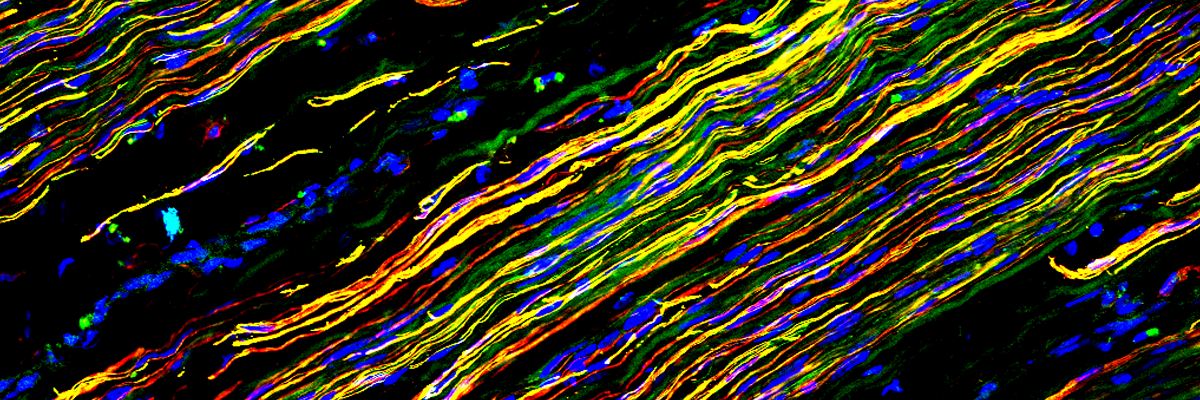Cognition and Neuroscience PhD
This degree offers a Cognitive or Systems and Cellular Neuroscience Track

In This Section
In order to find out about ongoing research opportunities, search our faculty, and learn about admissions, please choose either the (1) Cognitive Neuroscience or (2) Systems and Cellular Neuroscience track by selecting one of the two buttons below.
Choose Your Preferred Track
What’s the Difference Between “Cognitive” and “Systems and Cellular” Neuroscience Tracks?
Cognitive neuroscience research in the School of Behavioral and Brain Sciences (BBS) includes research in human psychology, including memory, perception, music and addiction. It is centered in our Department of Psychology and utilizes human neuroimaging tools such as MRI, EEG and PET. New students are directly admitted to a single research laboratory.
Systems and cellular neuroscience research in BBS focuses on neurobiological approaches in neuroscience, including molecular, cellular and systems approaches in animal models and humans. Research foci include learning and memory, stress, addiction and pain. It is centered in our Department of Neuroscience. New students typically rotate through multiple research laboratories to choose a dissertation laboratory.
All Program Faculty
Cognition and Neuroscience PhD FAQ
Is Financial Aid Available for Students?
Financial support of full-time doctoral students in cognition and neuroscience is awarded through teaching or research assistantship stipends, as well as tuition scholarships. Admitted students are automatically eligible for these sources of financial support. Please see the UT Dallas Graduate Admissions site for information on other sources of financial support for PhD students.
What is UT Dallas Like?
The University of Texas at Dallas in 2019 was ranked third among U.S. universities founded in the past 50 years and is in the top 20 such universities worldwide. The total enrollment is approximately 30,000, with more than 8,000 graduate students. The main UT Dallas campus is in Richardson, Texas — about 15 miles north of downtown Dallas. However, several research centers of the School of Behavioral and Brain Sciences are located in Dallas, near the campus of the UT Southwestern Medical Center. Both Richardson and Dallas are vibrant with opportunities for art, drama, music, athletics, and other activities. Visit the UT Dallas visitors website for more information about the University.
What are Richardson and Dallas Like?
Richardson and Dallas are richly diverse cities located in one of America’s largest and fastest growing metropolitan areas. The Dallas area boasts 50,000 acres of public park land, the nation’s largest urban arts district with an excellent symphony orchestra, opera, and art museums, five major sports franchises, multiple entertainment districts, and a thriving culinary scene. The DART rail system runs from the suburbs of Plano and Richardson to the arts district, downtown Dallas, and DFW airport. Yes, it is hot in the summer, but the average annual daily temperature is 65 degrees (spring, fall, and winter are great!). The area offers a reasonable cost of living and an abundance of sunshine.
Where Should I Live?
Most doctoral classes are held on the main UT Dallas campus in Richardson. Depending on the lab location of your faculty advisor, your duties as a research assistant may take place on the main campus in Richardson or at one of the centers in Dallas. Some student housing is available on the main campus in Richardson, but on-campus housing caters primarily to undergraduates. You can use online search engines to find options that fit your price range and target location.
What is the Admissions Process Like?
The admissions committee evaluates applications on several dimensions, including research experience, GPA and GRE scores (optional for both tracks), letters of recommendation and personal statements. In addition, the fit between the research interests of the applicant and faculty is very important. One to three preferred faculty mentors should be named in the application.
The admissions committee invites a short list of qualified candidates to visit UT Dallas for an interview. Admissions decisions generally are made in February, and admissions offers must be accepted or declined by April 15.
Should I Contact Faculty Members I Would Like to Work with Before I Apply?
Yes. We encourage you to identify faculty who share your research interests and contact them about current opportunities for admission. A primary consideration in PhD admission in the Cognitive Neuroscience track is a faculty member’s agreement to serve as a student’s mentor. For the Systems and Cellular Neuroscience track, there are options to do rotations with multiple faculty to determine the best fit for you.
When are Admissions Decisions Made?
Decisions on admission are made in mid- to late-February.
How Big is the PhD Program and How Many PhD Students are Accepted Each Year?
There typically are 70-80 students enrolled in the cognition and neuroscience PhD program. We accept, on average, 10-20 new students per fall semester.
What are the Outcomes for Graduates?
Over the last five years, the cognition and neuroscience program has graduated 43 PhD students. Of the 43 graduates, 30 have continued their careers at institutions of higher education, while 11 of our graduates have found employment in the private sector.
What Makes this Program Unique?
The PhD program in cognition and neuroscience overlaps with other programs in BBS. For example, many students do research and take courses in neuroscience, psychology and audiology. BBS provides an atmosphere where students are encouraged to learn from and work with experts in other programs. The cognition and neuroscience program can be distinguished from the other BBS programs by the focus on understanding the neural basis of behavior, cognition, perception, and sensory and motor processing.
Should I Apply for the Master’s Program or the PhD Program?
This depends on your goals. The master’s degree is appropriate for students interested in cognition and neuroscience training beyond the undergraduate level, or additional training to prepare them for doctoral programs or medical school. The PhD program is appropriate for students interested in careers in research and teaching and involves extensive training in research design and methodology.
Should I Apply for the PhD Program in “Cognition and Neuroscience” or “Psychology?”
These two programs have a number of things in common. There is overlap in some coursework of these programs and many of the faculty members involved in the Cognitive Neuroscience track are involved with both programs. The cognition and neuroscience program focuses more narrowly on cognitive neuroscience or systems and cellular neuroscience, including basic neurobiology (e.g., animal behavior and neurophysiology). The psychology program allows for broader training in psychology; students can select a concentration in developmental psychology, cognitive psychology or social/personality psychology. One way to decide what program may be best for you is to think about what type of department with which you see yourself affiliated in the future, and which degree best serves your career goals. The main departments serving the PhD programs are the Department of Neuroscience, Department of Psychology, and Department of Speech, Language, and Hearing.






